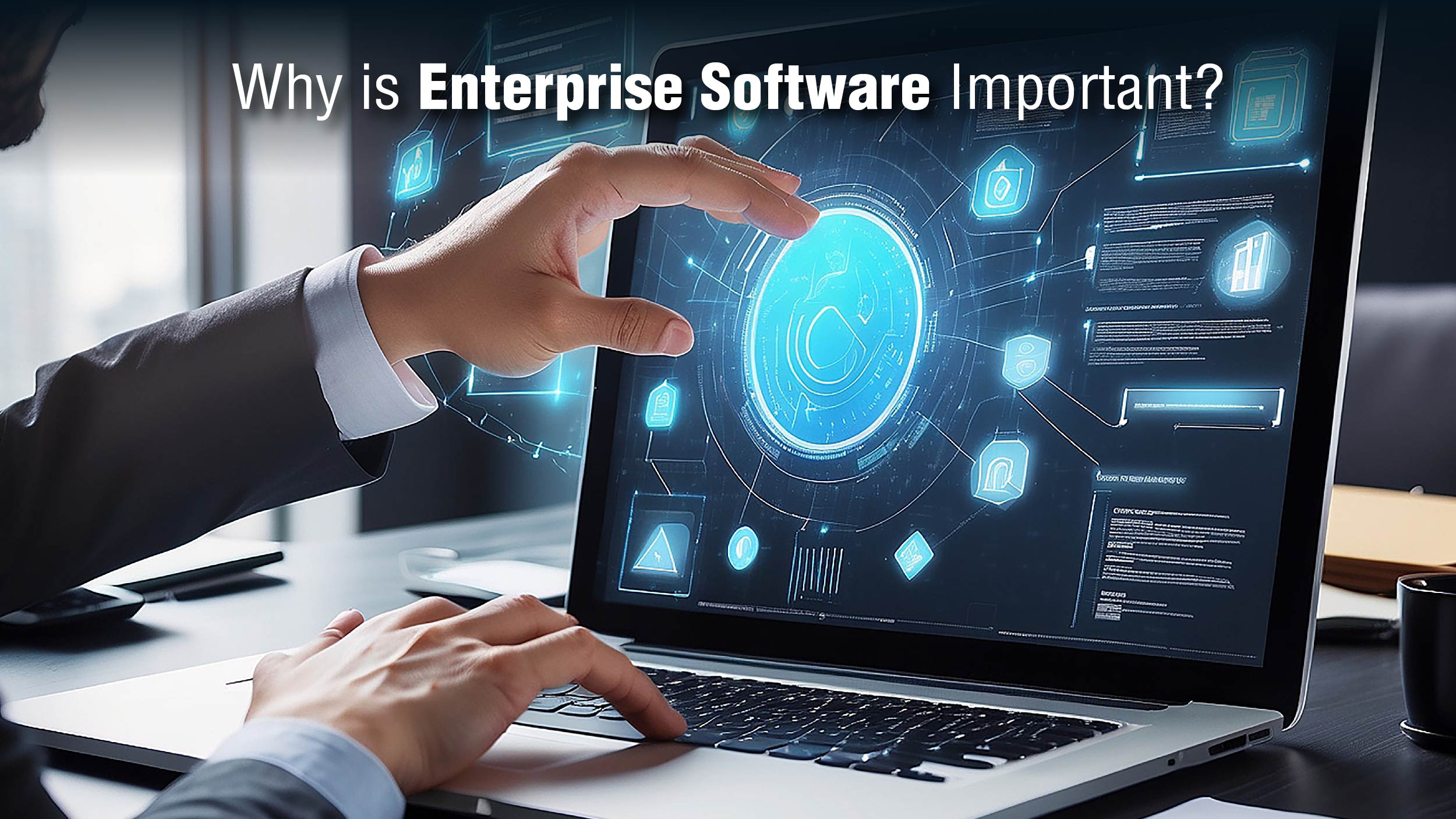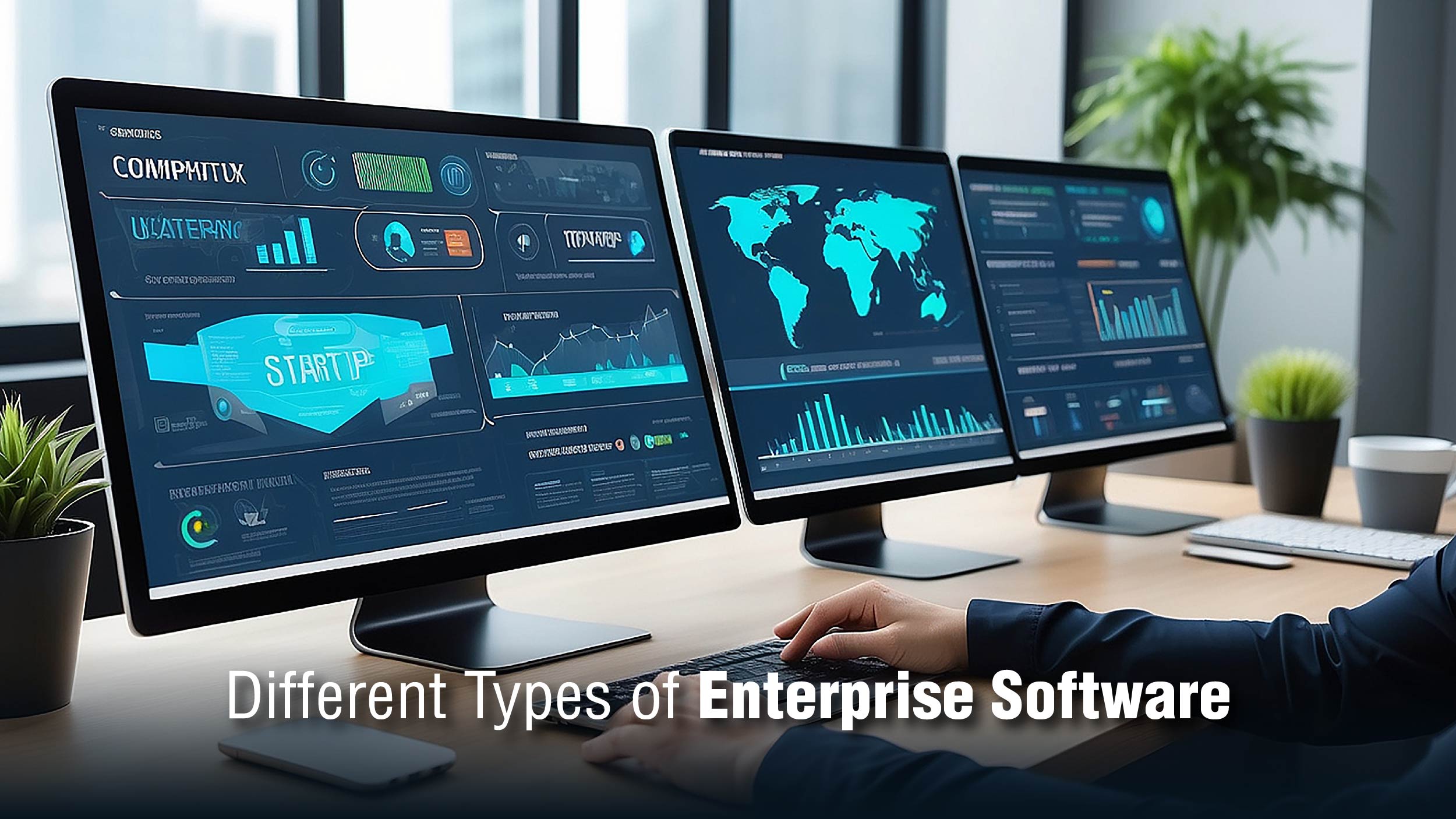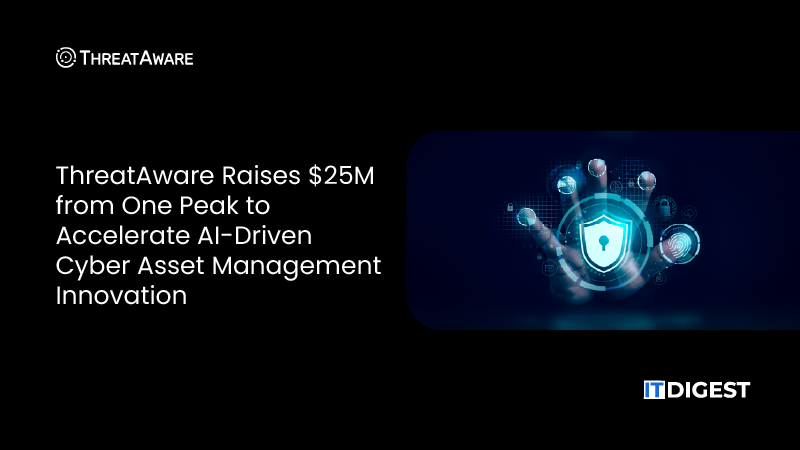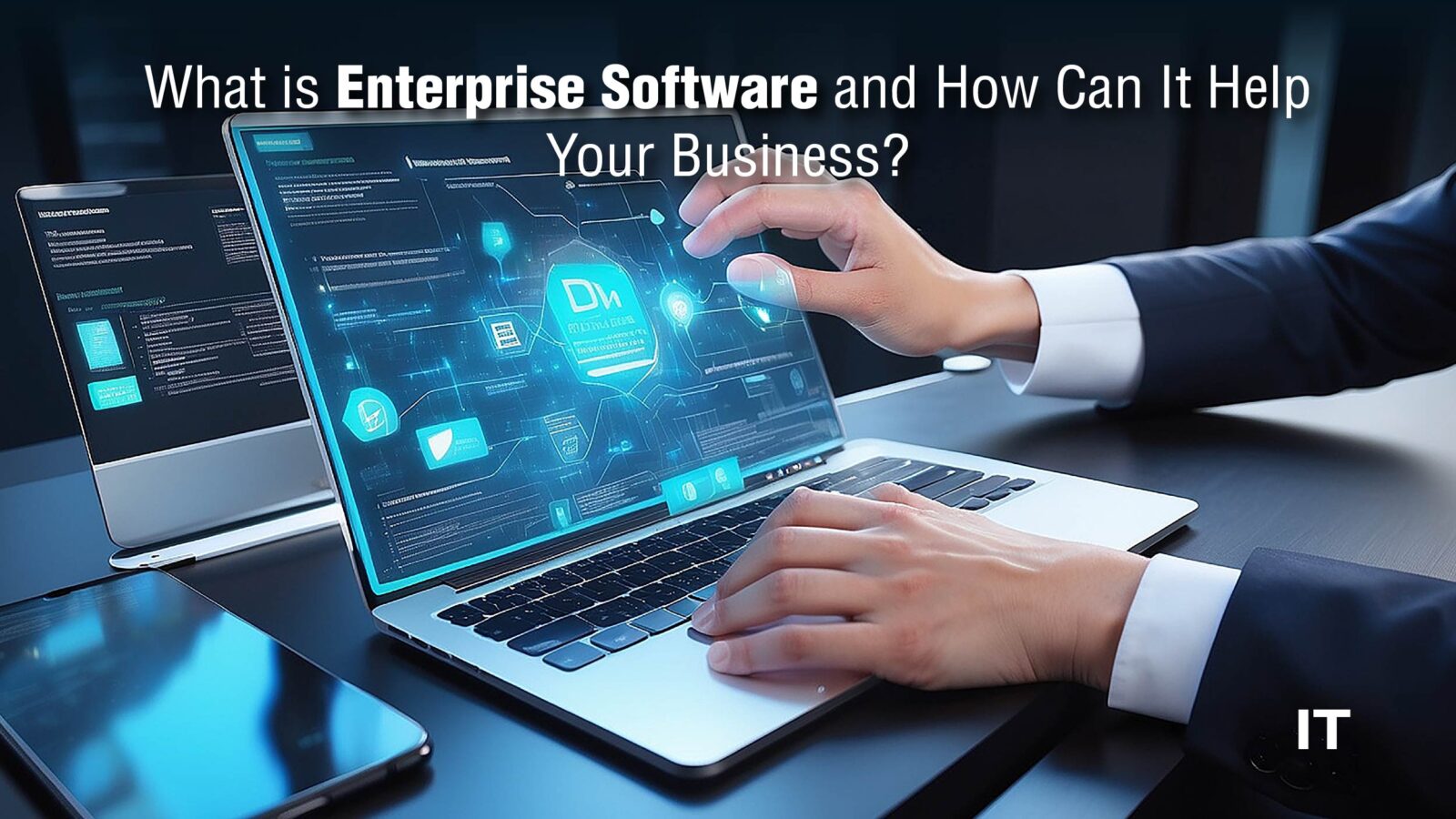One of the major challenges faced by businesses is the lack of streamlined processes. Studies indicate that companies lose 20-30% of annual revenue due to unorganized workflows and processes.
Companies often struggle to unify the tremendous amount of data along with managing complex operations. Enterprise software helps address this pressing issue and prevents bottlenecks and delays.
These tools are gaining popularity as the global enterprise software industry is projected to reach a valuation of $376.40 billion by 2028.
Learn about enterprise solutions and various business softwares used to improve effectiveness of business operations.
What is Enterprise Software?
Enterprise software, or enterprise application software (EAS), is a computer software tailored for organizations rather than individual users. Its primary goal is to meet organizational needs and streamline various business operations. This includes tasks like improving business reporting, facilitating production operations, managing customer service, and handling back-office functions.
Enterprise software is most often used for sales and CRM, HR and payroll management, customer support, email marketing, enterprise resource planning (ERP), data management and analytics, collaboration and communication, and security and compliance purposes within organizations.
Also Read: Unlocking the Potential of Software-Defined Perimeters
Why is Enterprise Software Important?
 Enterprise software plays a vital role in modern organizations for several reasons:
Enterprise software plays a vital role in modern organizations for several reasons:
- Resource Scalability: It allows organizations to scale their operations efficiently by directing resources to areas where they are most needed. For instance, tools like the Amazon Chime SDK enable the integration of scalable communication features into existing enterprise applications, helping to manage costs effectively.
- Organizational Efficiency: Enterprise software automates various tasks across departments such as HR, payroll, and marketing, reducing manual effort and enhancing overall efficiency. Standardized collaboration tools and workflow solutions also break down interdepartmental silos, promoting seamless communication and collaboration.
- Employee Productivity: By leveraging technologies like process automation, project management software, and AI-driven analytics, enterprise software empowers employees to work more effectively. These tools streamline workflows, provide actionable insights, and enable teams to communicate and collaborate from anywhere, enhancing productivity.
- Customer Satisfaction: Enterprise software solutions like CRM, marketing automation, and contact center software enable organizations to gain deep insights into customer preferences and behavior. By centralizing customer data and delivering personalized service experiences, enterprises can significantly improve customer satisfaction and loyalty.
Different Types of Enterprise Software
 Below are different enterprise tools used by various departments in an organization.
Below are different enterprise tools used by various departments in an organization.
HR Management
In large organizations, managing employees can be a complex task. Human resources departments handle various responsibilities, including hirings, promotions, retirements, vacations, and more.
Additionally, organizations must navigate labor legislation, which can be intricate and demanding. To support HR professionals in their work, specialized software is crucial for most enterprises.
– HR management software assists in handling employee-related tasks efficiently.
– It ensures compliance with labor laws, reducing the risk of legal repercussions.
– Streamlining HR processes improves productivity and accuracy.
Payroll Management
Managing payroll is closely linked to HR management, but it entails its own set of challenges. Employees expect to be paid accurately and on time, and any discrepancies can create legal and financial issues.
While HR professionals are involved in payroll, another category of professionals, accountants, often handles this task. Accounting software or modules within enterprise applications are necessary to facilitate payroll management.
– Payroll management software ensures accurate and timely payments to employees.
– It minimizes the risk of legal and financial consequences due to payment errors.
– Collaboration between HR and accounting professionals is crucial for seamless payroll management.
Customer Support
A thriving enterprise relies on satisfied customers, and providing excellent customer support is key to achieving this. Organizations typically have dedicated customer support centers to handle customer inquiries and resolve issues promptly.
Software designed for customer support systems plays a critical role in two ways. Firstly, it enables customer support representatives to efficiently assist customers. Secondly, it gathers valuable metrics that can improve the overall support process.
– Customer support software enables efficient handling of customer inquiries.
– Metrics collected by the software help organizations analyze and improve their support processes.
– Prompt and effective customer support enhances customer satisfaction and loyalty.
Email Marketing Systems
Acquiring new customers and nurturing existing relationships is vital for organizational success. Email marketing remains one of the most effective tools for communication in the business world. However, implementing a successful email marketing strategy requires more than simply sending mass emails.
Compliance with data protection regulations, such as GDPR, is crucial. Adopting dedicated email marketing systems provides the necessary tools to manage customer preferences and avoid potential legal and spam-related issues.
– Email marketing systems enable organizations to effectively communicate with customers.
– Compliance with data protection regulations is ensured, reducing legal risks.
– Managing customer preferences and engagement becomes easier with dedicated software.
Enterprise Resource Planning (ERP)
Enterprise Resource Planning (ERP) software plays a pivotal role in managing various business processes within an organization. As a comprehensive system, ERP integrates multiple departments and functions, providing an integrated view of resources and business events. It facilitates data sharing across the organization and even with external stakeholders, enabling efficient decision-making and resource allocation.
– ERP software offers an integrated approach to managing core business processes.
– Real-time visibility into resources and business events enhances decision-making.
– ERP systems are no longer limited to large corporations, with smaller organizations and startups also benefiting from their capabilities.
Best 5 Enterprise Software For Business Growth
BUSINESS INTELLIGENCE (BI)
Business intelligence (BI) stands as the pinnacle of effective data analysis, management, monitoring, and intelligent reporting. This transformative field offers a plethora of benefits, with software providers revolutionizing the industry by catering to diverse enterprise needs. Let’s delve into an illustrative example:
Key Features:
- Beginner and advanced data analysis for all industries and departments.
- Modern data visualizations via interactive business dashboards.
- There are versatile sharing options, including public URLs, automated reports, email, and embedding.
Datapine spearheads the enterprise software sector by delivering cutting-edge business intelligence solutions globally. By seamlessly connecting data sources, users can explore a spectrum of enterprise possibilities, ranging from intuitive data analysis via a drag-and-drop interface to advanced SQL mode. With an impressive rating of 4.8 stars on Capterra and 4.6 stars on G2Crowd, datapine emerges as a premier choice for empowering organizational operations.
CUSTOMER RELATIONSHIP MANAGEMENT (CRM)
Customer relationship management (CRM) emerges as a cornerstone in the business pipeline, irrespective of company size. By scrutinizing customer data to inform better sales decisions and monitor customer activities, CRM emerges as an indispensable enterprise tool for optimizing interactions and fostering relationships with prospects.
Key Features:
- Centralized, cloud-based software for comprehensive CRM endeavors.
- Customer 360 products consist of 12 core solutions.
- AI-driven functionalities include predictive scoring and intelligent automation.
Salesforce, hailed as the industry standard for CRM, offers a cloud solution dedicated to acquiring, retaining, and nurturing customers across various platforms. With a diverse portfolio encompassing sales and service platforms, e-commerce solutions, app integrations, and personalized marketing, Salesforce delivers unparalleled versatility in customer management. Rated 4.4 stars on Capterra and 4.3 stars on G2Crowd, Salesforce emerges as a robust CRM solution unifying sales and customer endeavors.
ACCOUNTING SOFTWARE
Modern accounting software revolutionizes financial management for large enterprises, replacing cumbersome spreadsheets with efficient, automated tools. These platforms not only streamline key reporting and analytics functions but also track day-to-day financial activities, including asset, expense, and revenue management.
Key Features:
- Real-time job costing ensures projects stay within budget.
- Intercompany transactions consolidate financial statements from multiple companies.
- Robust inventory management features automation and multi-level categorization.
QuickBooks Desktop Enterprise emerges as a comprehensive desktop-based financial management tool, offering a gamut of functionalities from invoicing to inventory management. With over 200 customizable templates for cash flow analysis, item profitability, and more, QuickBooks Enterprise caters to the diverse needs of large companies. Rated 4.5 stars on Capterra and 4.2 stars on G2Crowd, QuickBooks Enterprise stands out as a premier enterprise accounting software solution.
CUSTOMER AND USER FEEDBACK
User feedback emerges as a valuable resource for enhancing the customer experience, leveraging data and analytics to proactively improve products and disseminate insights across the organization. Mopinion stands as a prime example in this domain.
Key Features:
- Customizable feedback forms for websites, native apps, and emails.
- Seamless integration with CRM, project management, or web analytics applications.
- Real-time customer feedback and comprehensive analysis of open texts and values.
Mopinion offers an all-in-one user feedback platform, empowering digital enterprises to manage digital touchpoints effectively. By providing customizable feedback forms and visual user feedback, Mopinion enables insightful analysis of user behavior and preferences. Rated 4.1 stars on Capterra and 4.1 stars on G2Crowd, Mopinion emerges as a software solution driving customer-centricity and innovation.
ONLINE PAYMENTS
The payment processing industry relies heavily on online payment software to facilitate seamless transactions. Stripe exemplifies excellence in this realm.
Key Features:
- Simple, usage-based pricing model with no hidden fees.
- Intelligent billing and subscription management.
- Over 100 functions cover all aspects of the payment procedure.
Stripe, a global leader in online payments, offers a robust platform renowned for its ease of use and comprehensive functionalities. With its seamless integration options and competitive pricing, Stripe emerges as a preferred choice for businesses worldwide. Rated 4.4 stars on G2Crowd and an exceptional 4.7 stars on Capterra, Stripe stands as a testament to excellence in online payment solutions.
Bottom Line
Enterprise software stands as a powerful solution for organizations seeking to overcome complex challenges and achieve success. From streamlining HR and payroll management to providing exceptional customer support and enabling effective email marketing, enterprise software offers comprehensive tools and functionalities. Embracing enterprise tools empowers businesses to optimize processes, improve efficiency, ensure compliance, and drive growth.

































